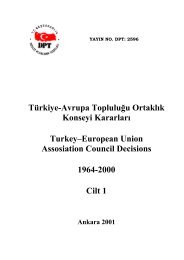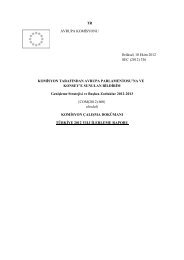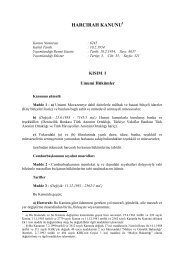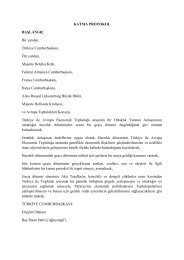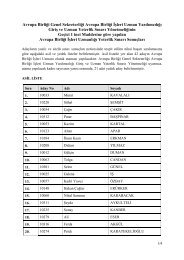2010 ilerleme raporu - Avrupa BirliÄi BakanlıÄı
2010 ilerleme raporu - Avrupa BirliÄi BakanlıÄı
2010 ilerleme raporu - Avrupa BirliÄi BakanlıÄı
Create successful ePaper yourself
Turn your PDF publications into a flip-book with our unique Google optimized e-Paper software.
Training and technical assistance to strengthen central institutions involved in IPA<br />
implementation has continued and the setting-up of management and control systems has<br />
further advanced. Concerns remain about the capacity of the institutions to effectively and<br />
efficiently manage IPA funds. Use of funds is marked by delays in contracting and there is a<br />
serious risk that not all funds allocated can be absorbed and that the impact and results are less<br />
than anticipated. High staff turnover in the DIS institutions, lack of coordination among<br />
institutions and delays in the preparations of the operating structures in line ministries to take<br />
over duties of contracting and payments from the central finance and contracts unit (CFCU)<br />
have aggravated these concerns. The capacity of the CFCU needs to be urgently adjusted to<br />
the new timetable to ensure the full and sound use of EU funds allocated. To address these<br />
risks, supervision by the NAO needs to be strengthened, urgent measures have to be taken and<br />
capacity needs to be brought rapidly into line with the amount of funds under implementation.<br />
Administrative capacity at regional level remains weak. The regional development committee<br />
(RDC), which aims to coordinate regional development policies among central institutions<br />
and between the local level and the centre is envisaged as a main element of Turkey’s new<br />
regional policy and is scheduled to be established in <strong>2010</strong>, but no concrete developments can<br />
be reported yet.<br />
Some progress was made with regard to programming and programme implementation.<br />
Improvements have been made in building up project pipelines for IPA, particularly in the<br />
environment, regional competitiveness and employment operational programmes. This should<br />
improve absorption of funds in the medium term. In some minor revisions of the OPs<br />
budgetary and timing aspects as well as geographical targeting were fine-tuned. As<br />
implementation is at an early stage more comprehensive conclusions on the impact and results<br />
can only be drawn later on.<br />
In the area of monitoring and evaluation, some progress was made. Working groups<br />
between the IPA operating structures and the state planning organisation have been active,<br />
and progress was made in setting up the integrated management information system (MIS).<br />
Sectoral monitoring committees for all IPA components continued to meet on schedule.<br />
In the area of financial management and control, some progress was made. However,<br />
capacity building and preparations for conferral of management within the operating<br />
structures are lagging behind and the timetable for enabling these structures to take over<br />
financial management and control responsibilities from the CFCU could not be adhered to, so<br />
that the takeover had to be postponed until 2011 in the case of Transport and Human<br />
Resources Development and until 2012 in the case of Regional Competitiveness. As a result,<br />
the co-operation agreements with the CFCU need to be extended beyond the current deadline<br />
of 31 December <strong>2010</strong>.<br />
Conclusion<br />
Progress, albeit uneven, was made in this area. In particular, the legislative and institutional<br />
framework for implementation of IPA components III and IV has been finalised, involvement<br />
of local and regional stakeholders in preparing the project pipeline has been improved and the<br />
DAs are well on the way to becoming fully operational. In order to prepare effectively for the<br />
use of structural instruments (Structural Funds and Cohesion Fund) upon accession,<br />
administrative capacity of central, regional and local institutions should be reinforced.<br />
Moreover, pre-accession funds have to be used more effectively and the absorption capacity<br />
of key institutions, namely the CFCU and Operating Structures in line Ministries needs to<br />
increase in order to demonstrate readiness to absorb larger amounts of EU funds.<br />
EN 74 EN




